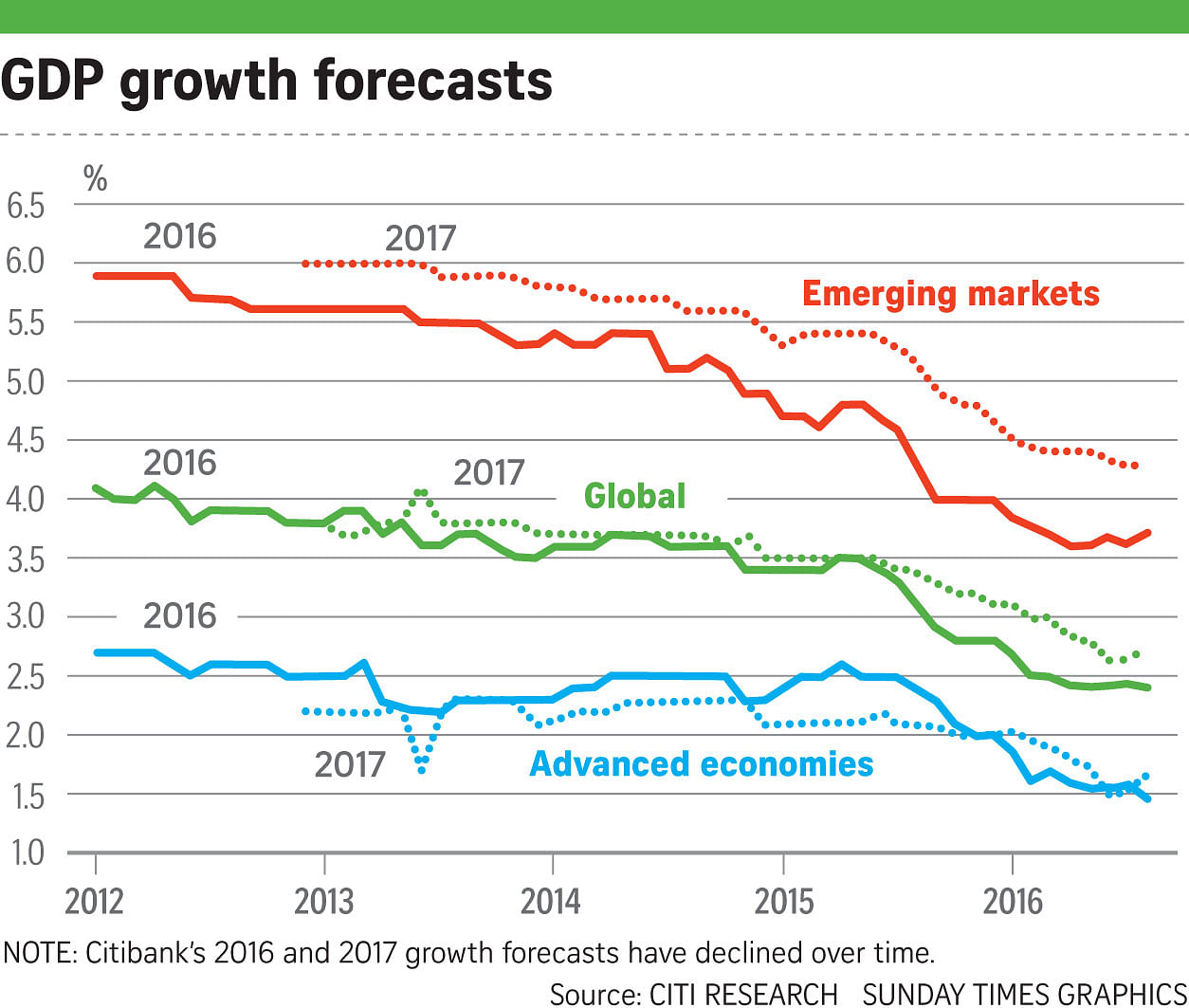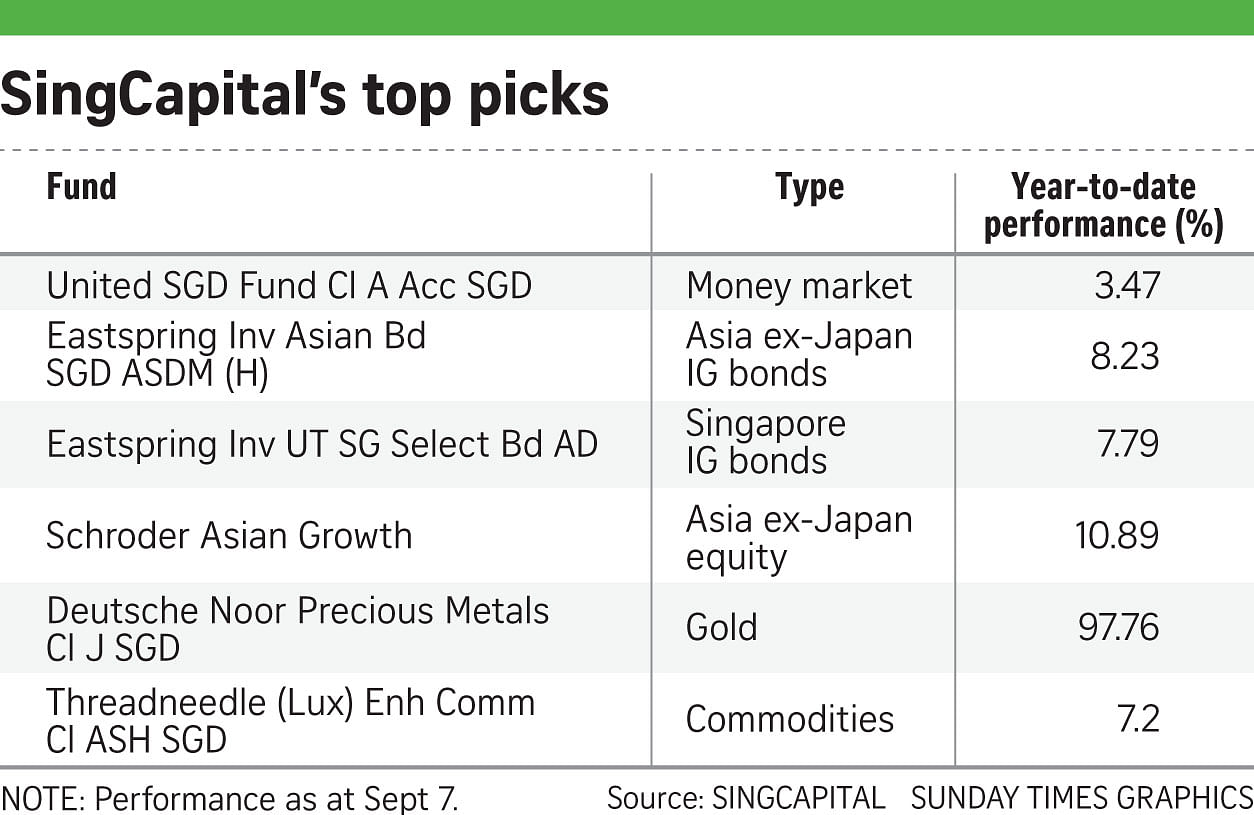-

Citibank's Mr Zal Devitre says he prefers quality investment grade bonds issued by credible governments and good firms.
Wateram Capital's Mr Sam Phoen cautions against investors taking excessive risks to make up for shortfall in yield.
OCBC's Mr Vasu Menon says one should not expect double digit gains but aim for high single-digit gains from equities.
UOB's Ms Chung Shaw Bee suggests diversification by investing across asset classes and geographies via unit trusts.
SingCapital's Mr Alfred Chia believes there is still much upside for gold. It is a good investment in times of uncertainty.
DBS' Mr Marc Lansonneur advises investing via regular savings plans to mitigate effects of market volatilities.
OCBC's Ms Carmen Lee expects STI to stay within a tight range for this year. Her top picks include Ascendas Reit.
Set your sights lower in a volatile, low-yield market
Diversification is even more critical and one must look for low-cost options, say experts

If making money work harder for you was challenging in recent years, brace yourself because it is going to get tougher.
Whether we like it or not, the new norm is that of low growth, low yield and a prolonged period of relatively low global interest rates.
Recent reports have indicated significantly lower and volatile investment returns in the coming years.
For instance, GIC said in its annual report that it anticipates significantly lower and more volatile returns in the next 10 to 20 years, compared with its experience in the last two to three decades.
This is due to a difficult investment environment with modest growth prospects, greater uncertainty and a high degree of volatility.
Private-sector think-tank McKinsey Global Institute's report, "Why investors may need to lower their sights", highlights that returns on equities and fixed-income instruments in the United States and Western Europe over the next two decades could be "considerably lower" than they have been in the past 30 years.
It suggested that while US and European equities averaged 7.9 per cent a year in real returns over the past 30 years, they may deliver only 4-6.5 per cent a year and 4.5-6 per cent a year in real returns respectively over the next 20 years.
Financial experts advise that investors need to prepare for the bumpy road ahead.
Mr Vasu Menon, vice-president and senior investment strategist, wealth management Singapore, OCBC Bank, said: "Strong double-digit gains may be hard to come by in future and investors should moderate their expectations, and perhaps aim for high single-digit annualised gains, especially from equity markets."
Mr Sam Phoen, co-founder of investment management firm Wateram Capital, highlighted that it is important for investors to be aware of the new norm "so that they do not take excessive leverage and risks just to make up for the yield shortfall".

Financial experts also recommend that with potentially lower investment returns in the future, retail investors should look for investment options that are low-cost but effective. After all, cost is one of the few things that we can control in our investments.
While volatility and uncertainty are only going to increase, and global fundamentals do not seem very favourable, Mr Alfred Chia, chief executive of financial advisory firm SingCapital, said that there are still opportunities and strategies to get the most out of the current global situation.
Top 8 tips for retail investors
1. DIVERSIFICATION
Diversification is now even more critical to protecting investments. Ms Chung Shaw Bee, head of wealth management for Singapore and the region, UOB, suggests that investors spread the risk of their investments by investing across asset classes and geographies through unit trusts.

She said: "A simple way to do so is to invest in global multi-asset funds which span different geographies and asset classes, such as equities, bonds and real estate investment trusts (Reits). Spreading one's funds globally across different investment types and geographies can help to ensure that no single component is able to significantly affect the performance of an investment portfolio."
Investment managers can also help investors to reduce risk by overlaying their strategies and managing investment volatilities.
Diversifying across asset classes can be complemented with investing through a dollar-cost averaging strategy, which may offer better risk-adjusted returns in the long term, said Mr Menon.
One way to do this is to invest regularly via regular savings plans to mitigate the effects of market volatilities, said Mr Marc Lansonneur, DBS Singapore's head of investment products.

In addition, Mr Menon advised investors to change mindsets from focusing on capital gains to taking a more income-oriented investment approach. This means paying greater attention to, and investing in, stocks, bonds or unit trusts that can offer fairly attractive yield.
2. EQUITIES AND BONDS
Mr Chia recommends that retail investors reduce their allocations to equities for the developed countries and, instead, focus on equities in Asia excluding Japan.
"Among these equities, hold onto blue chip firms with strong records of dividend payouts. Also, focus on defensive sectors such as utilities, consumer staples and healthcare. There are mutual funds that invest in a selection of Asian companies with good allocation across countries such as India, China and the Asean region," he said.
Within the fixed-income space, both Mr Zal Devitre, head of investments at Citibank Singapore, and Mr Chia said they prefer quality investment-grade bonds issued by credible governments and good companies.
"These assets should continue to pay coupons and maintain their value in the current low-interest-rate environment," said Mr Devitre.
3. EMERGING MARKETS
Citibank is also increasingly positive on emerging markets. And this optimism is driven by two factors.
First, it does not expect the US dollar to significantly appreciate in future, which is typically positive for emerging market assets.
Second, commodity prices have stabilised, which will provide support to commodity-producing countries in these markets.
4. UNDERLYING FUNDAMENTALS
In the chase for good yields, it is prudent to assess the underlying fundamentals of the investments to ensure that they do not carry high risk and that the yields are sustainable.
For example, when investing in high-yield bonds, look at the company's balance sheet, cash flow and credit metrics to assess default risk.
For stocks offering an attractive dividend yield, it is best to buy into firms with steady businesses, strong balance sheets, good cash positions, healthy cash flows and a good track record of dividend payments.
These factors can affect the ability and willingness of companies to sustain their dividend payouts in future, said Mr Menon.
5. CASH
Sitting on cash - which can be parked in money market funds - while waiting for the right investment opportunity and/or when markets correct, may be the smart thing to do right now.
"Keep your powder dry, stay in low-risk products, avoid low-quality credit, resist over-leveraging and you are likely to find bargains in the not too distant future," said Mr Phoen, who is also author of High Net Worth Investing.
On the currency front, Mr Chia recommends US dollars - the global reserve currency - and the Singdollar, as historically, the US dollar has always appreciated during times of crisis.
6. REAL ESTATE AND PRIVATE EQUITY
Mr Phoen noted that real estate prices in Singapore's prime areas have fallen to levels where interest is beginning to surface.
"The raft of recent sales is a sign, and those flush with cash looking for long-term investment and inflation hedge should start to do their homework and get ready," he said.
For high-net-worth investors, private equity continues to be a good alternative investment product due to its uncorrelated return profile. Still, Mr Phoen advised that as the risks in private equity are commensurate with its potential returns, investors should be well diversified in this asset class and avoid concentrated investments in just one or two private equity firms.
7. GOLD
Since 2011, gold had entered a bear market falling to US$1,069.40 (S$1,453.34) in December last year from US$1,854.40 in September 2011. Since then, it has recovered to US$1,336.34 as of Friday.
Mr Chia believes that there is still much upside for gold. After all, gold has proven to be not only a good hedge but a good investment during times of uncertainty. Investing in gold mining firms is another option to capitalise on increasing gold prices. One way is to invest via unit trusts that invest in diversified portfolios.
8. COMMODITIES
Just like gold, commodities had taken a beating over the years. However, Mr Chia believes that going forward, there is much upside.
One of the driving factors behind this is the One Belt, One Road initiative by China. It is a development strategy that focuses on connectivity and cooperation between China and the rest of Eurasia. Through this initiative, there will be regional infrastructure projects that would increase demand for raw materials/commodities.
STI outlook Ms Carmen Lee, head of OCBC investment research, noted that Singapore's benchmark Straits Times Index (STI) is trading at about 4.1 per cent yield at current levels.
"This is a decent return and is higher than the 10-year average of about 3.6 per cent. In addition, the STI is also trading at one of the lowest price-book ratios in recent history of about one times book. This is in sharp contrast to two to three times book for some of the regional markets, including the Philippines and Indonesia," she said.
Within the STI, the indicative range for dividend yield is from 1.4 per cent for Golden Agri to as high as 6.4 per cent for Ascendas Reit.
As the interest in the yield theme remains, both telecommunications and S-Reits have done well this year.
For the telcos, the range is from 4.3 per cent (Singtel) to 5.7 per cent (M1). For the banks, the range is from 3.9 per cent (UOB) to 4.2 per cent (OCBC).
Ms Lee expects the STI to stay within a tight range for the rest of this year.
She said: "This is largely as a result of uncertainty and perhaps volatility ahead of the US presidential election and possible rate hike later in the year.
"On the local front, the downside for the STI is well supported by low valuations at the 2,700 level. However, on the upper end, it is also likely to be limited and capped at the 2,950 level due to the lack of price drivers."
Her top picks include Ascendas Reit, CapitaLand, DBS, Frasers Centrepoint Trust and Keppel DC Reit.
Financial experts recommend that with potentially lower investment returns in the future, retail investors should look for investment options that are low-cost but effective. After all, cost is one of the few things that we can control in our investments.
Join ST's Telegram channel and get the latest breaking news delivered to you.
A version of this article appeared in the print edition of The Sunday Times on September 11, 2016, with the headline Set your sights lower in a volatile, low-yield market. Subscribe

